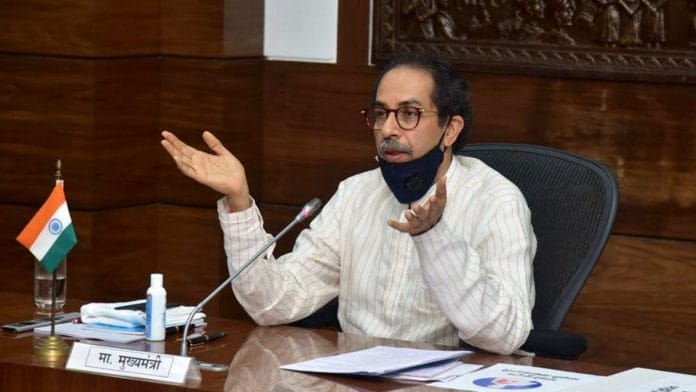New Delhi: The Maharashtra government has withdrawn the general consent extended by it to the Central Bureau of Investigation (CBI) to probe cases in the state. In episode 599 of ‘Cut the Clutter’, Shekhar Gupta explained the law and politics behind the move.
The CBI was set up under the Delhi Special Police Establishment Act of 1946. This law was enacted to give the CBI powers to investigate cases of corruption involving central government employees. However, under section 6 of the Act, the state governments can withdraw this permission accorded to the CBI.
According to Gupta, the politics involved in this entire CBI-Maharashtra government clash is similar to cue sports like billiards or pool, where every ball hits another ball to eventually pocket one. “Similarly, politics is also not a straight line,” Gupta said.
Also read: ‘Don’t need your certificate for my Hindutva’ — Uddhav lashes out at Maharashtra Governor
Two FIRs in UP and Maharashtra
In Lucknow’s Hazratganj police station, a person called Kamal Sharma, who is an associate in the advertising business, filed an FIR saying that some unknown people were conspiring to fix television rating points (TRPs). In this case, the police took prompt action and even handed the case over to the CBI.
A few days ago, the Maharashtra government had also got its own police to register a case in the state for alleged TRP fixing by three TV companies, including Republic TV.
Now since TRPs is not something that is specific to one state, the CBI, which is already investigating the case in UP, can make it an inter-state case and take over all related FIRs in all states, including the one in Maharashtra. And this would have taken the Maharashtra Police off Republic TV‘s back, said Gupta.
“You know, who bats for which TV channel now and you know which TV channel bats for which part or government or leaders now,” he added.
However, it is not as if Maharashtra government’s decision to withdraw the general consent will block the CBI. The CBI can now go to the Supreme Court and could request the top court to allow them to take over this case since it is an inter-state crime.
“The court also took cognisance of the FIR registered in Sushant Singh Rajput’s case in Patna, which was far from the place of occurrence of the incident. So in this case as well, the CBI will still be able to put this one past the Maharashtra government,” said Gupta.
Also read: Arnab Goswami vs rest: How TRPs can be fixed, and why TV news is caught in a vicious fight
Centre- state relations
Ever since Prime Minister Narendra Modi came to power, he has been saying that there should be cooperative federalism. But what has worked out in real life is exactly the opposite of it, said Gupta.
It is not just a question of what resources the state gets from the government, but also about how the central government uses its special powers in areas of law and order where it has more power than the state government, he added.
Maharashtra is also not the only state that has withdrawn its general consent.
The first to do so was Chandrababu Naidu in Andhra Pradesh in November 2018. Similarly, the Mamata Banerjee government in West Bengal also withdrew consent in the same month.
In July this year, Rajasthan wrote a letter to the central government to withdraw its consent. In 1999, the G.H. Patel government in Karnataka had withdrawn the state government’s general consent from the CBI, which is still not restored.
The central agencies have been misused by every government, but the BJP has now taken it to a level where nobody could have imagined. Central agencies are weaponised in a way they’ve never been done in the past, said Gupta.
As a result, trust has broken down between the central and state governments, which can have other consequences.
Central agencies like the National Investigation Agency and the Income Tax department carry out raids and if the state governments stop cooperating, this will cause a big constitutional crisis, noted Gupta.
Watch the latest episode of CTC here:







While all this may be true, the scope of Mumbai police investigation is narrow, while TRP is a pan-India issue. Yes, CBI is barred from investigating in Maharashtra, but nothing prevents them to summon BARC and Hansa officials to Delhi and interrogate them. Similarly, many news Channels are located in Delhi. These channels, more particularly India Today can be summoned by CBI in Delhi. Withdrawing the general consent to CBI is a double-edged weapon. BJP ruled states in retaliation can obstruct Maharashtra police to enter their states and carry out investigation. If a person commits a crime in Mumbai and runs away to Delhi, Delhi police can block Mumbai police to come to Delhi and arrest this guy.